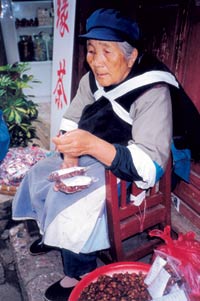
The Naxi minority works to keep old customs strong
By Yap Su-Yin
Atoothy lady in her 80s sits on a tiny stool next to a bubbling canal in the old town of Lijiang, a remote spot at the bottom of the Himalayas by the Qinghai-Tibet Plateau in northwest Yunnan Province. The aging grande dame, her face wrinkled like dried fruit, wears a peacock blue cap. Around her shoulders drapes a T-shaped blue cape with seven colorful disks sewn onto it. These "stars" symbolize the burden of heaven, which the women of her tribe bear on their backs.
She is deep in concentration as she embroiders spiritual symbols on a piece of circular cloth in her lap. It represents the sun, or nimei in her ethnic tongue. When it's finished, she will sew this onto the left shoulder of her daughter's cape. The right shoulder will bear the symbol of hengmei, or moon. Sun and moon signify day and night, around which her daily life revolves. Her attire and sewing project immediately distinguish her as Naxi, one of China's 56 officially recognized minority groups.
Descendants of grasslands tribes in northeastern Tibet, the Naxi are an ethnic group of nearly 280,000 people living in Yunnan and Sichuan provinces. The main Naxi settlement is in the area around Lijiang, whose charming streets and historical buildings (much of which was rebuilt after a 1996 earthquake) have earned it a spot on UNESCO's World Cultural Heritage list.

As part of one of the last matriarchal minorities in China, Naxi women have long been in charge of business and family life - a system that still survives, particularly in the Yongning area, north of Lijiang. There, in areas around Lugu Lake, lives a sub-group of Naxi called the Mosuo who continue to follow the matriarchal customs. Children adopt the mother's, not the father's, surname. Female elders oversee significant issues like marriage, family life, property and disputes. In Naxi relationships, both partners are free to have different companions and cohabitation without marriage is widely accepted. A boyfriend is allowed to openly stay overnight at his girlfriend's home. If a child is born to the couple and they do not wed, the woman - as head of the family - will raise their child.
The group's females, as the pillars of the family, rear farm animals, brew wine and weave cloth. If they are not on the way to the market or running errands, they are playing cards or chess with friends, knitting or babysitting their grandchildren. Women also make decisions on matters like property and marriage when they arise.
But though this matriarchal system is still adhered to in some areas, in places like Lijiang, Weixi and Yongsheng counties, conventional family structures - such as monogamy and patriarchy - prevail. There, the Naxi are distinguished by other traditions. The old section of Lijiang reflects the Naxi people's love for nature, as well as their deep appreciation for culture and their roots.
|

![]() 北京市通信公司提供网络带宽
北京市通信公司提供网络带宽
